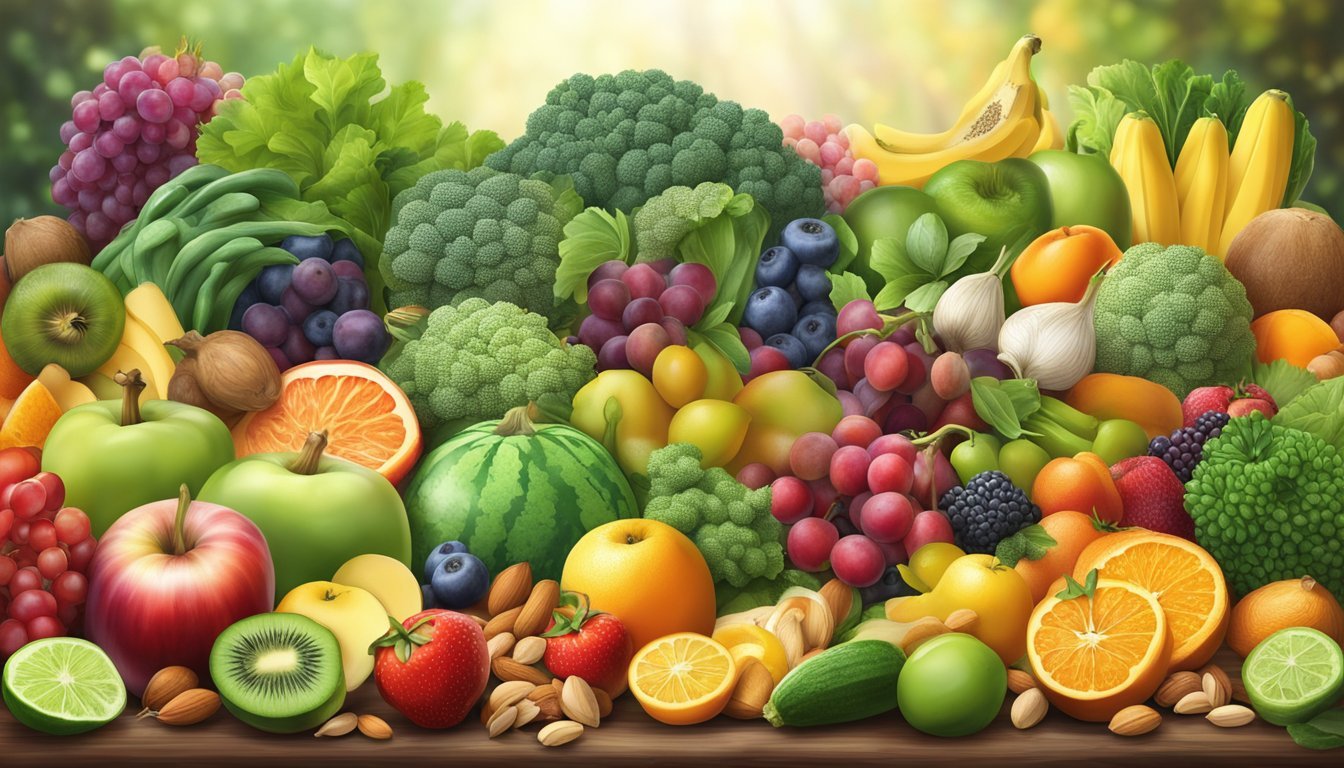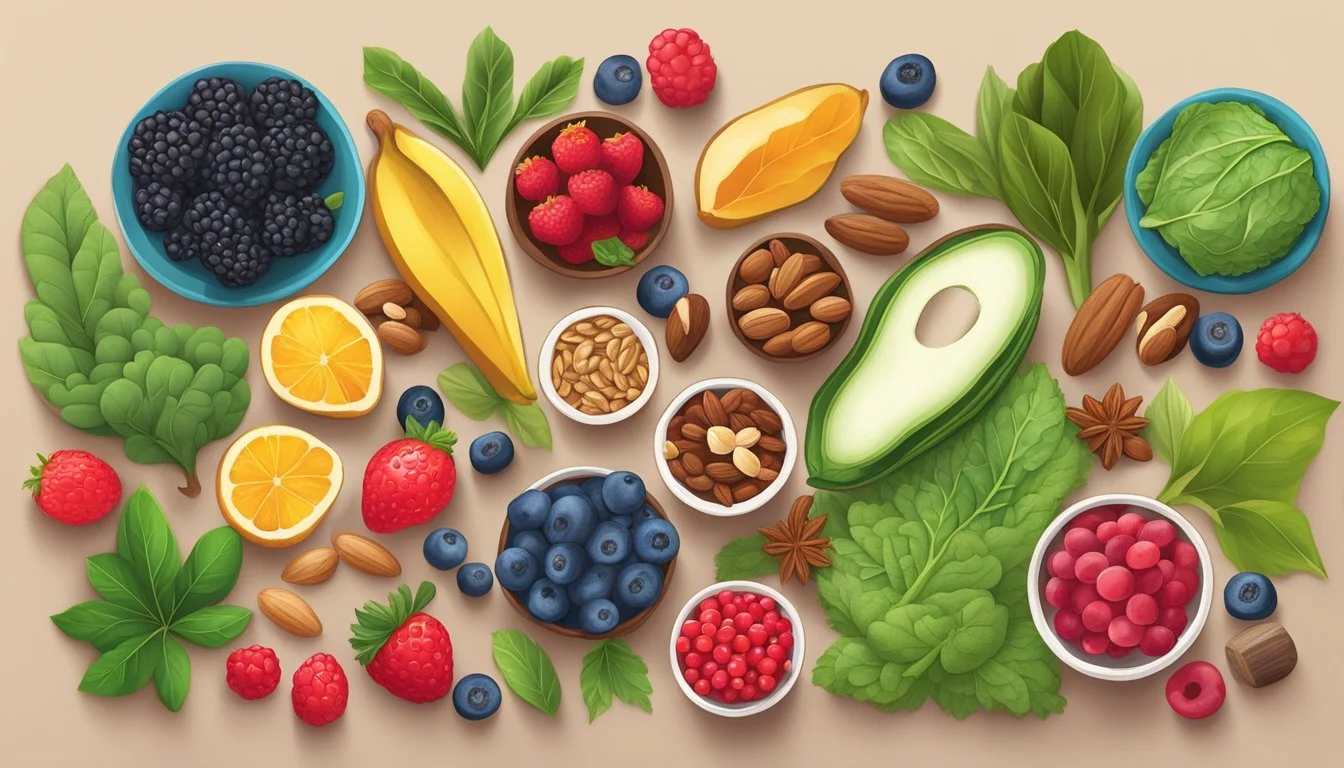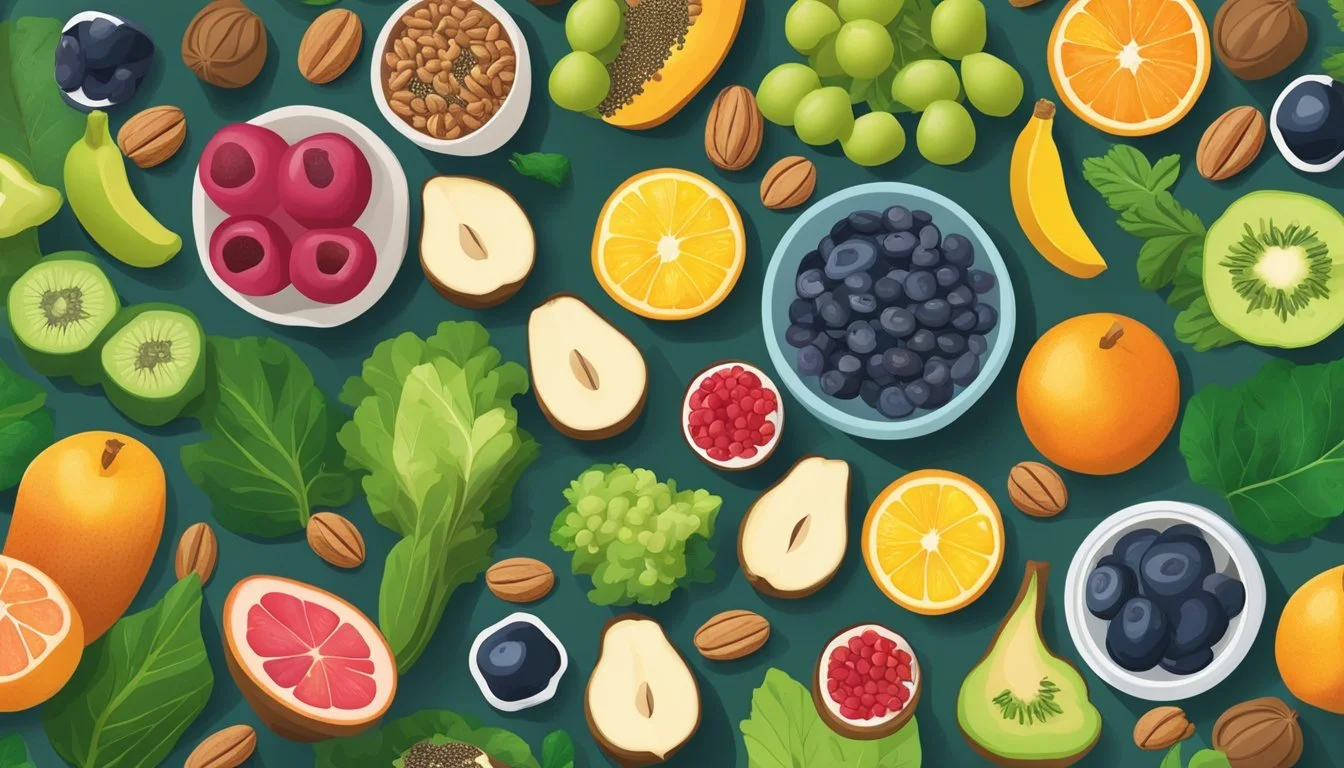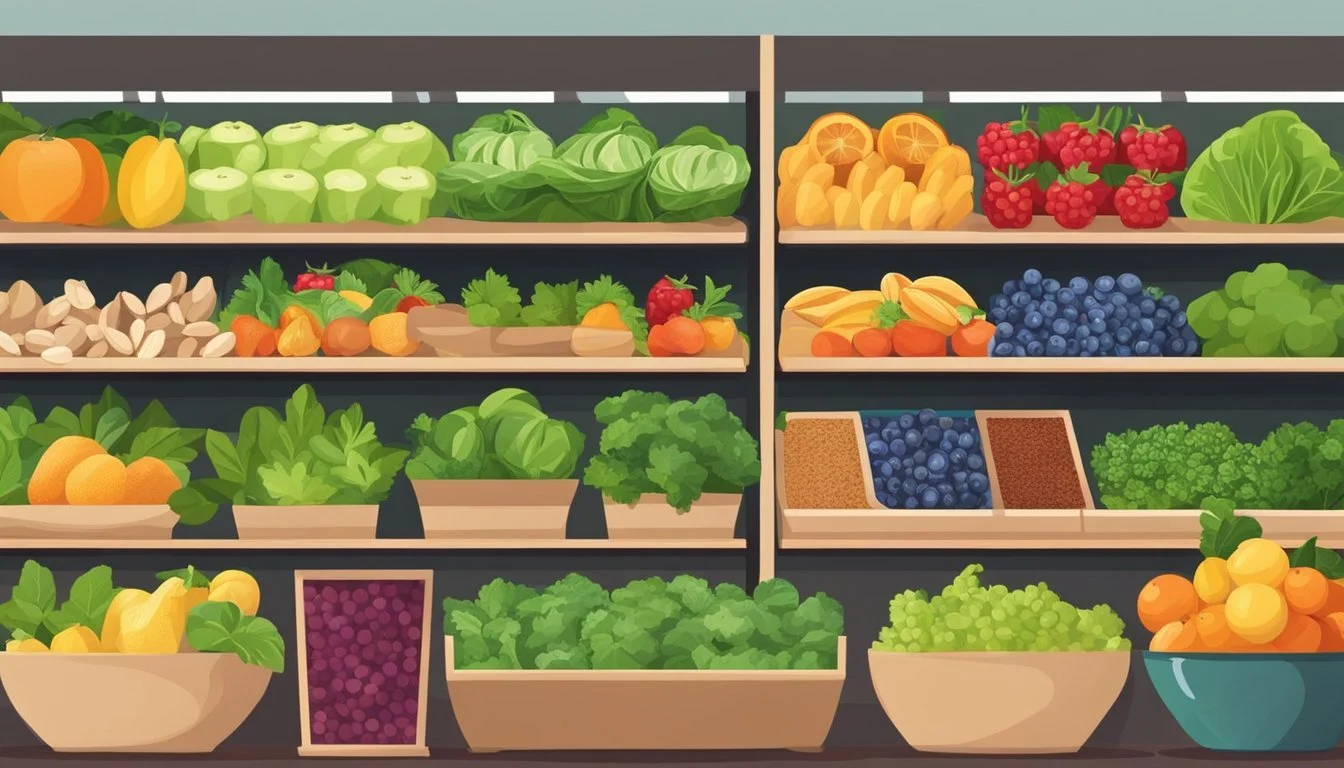The Most Powerful Superfoods
Unlocking Optimal Health and Vitality
Superfoods have garnered significant attention in the nutrition world due to their high density of nutrients and many health benefits. These foods are praised for their rich concentrations of vitamins, minerals, and antioxidants, which play pivotal roles in maintaining and enhancing overall health. They offer a diverse range of benefits, from reducing inflammation to bolstering the immune system, and are considered key components of a balanced and health-conscious diet.
Antioxidants found abundantly in many superfoods, serve to protect the body's cells from oxidative stress, a factor in various chronic diseases. Including superfoods in one's diet can contribute to heart health, and weight management, and may even help combat certain illnesses. These nutrient powerhouses, such as dark leafy greens, which are packed with vitamins and minerals, and fatty fish rich in omega-3 fatty acids, support not just physical well-being but also cognitive health.
Nutritionists emphasize the importance of integrating a variety of these potent foods into one's daily regimen rather than focusing on single items. By doing so, individuals benefit from a synergy of beneficial compounds working together to optimize health. Superfoods are not a cure-all but, when included as part of a varied diet, they can significantly enhance the overall nutritional profile and may contribute to the prevention of health issues down the line.
Defining Superfoods
Superfoods are foods exceptionally rich in vitamins, minerals, and other nutrients beneficial to one's health. These foods are not only high in nutritional value but also offer compounds that can enhance well-being and potentially reduce the risk of disease.
Nutrient Density and Health Benefits
Nutrient density refers to the concentration of beneficial nutrients like fiber, vitamins, minerals, and protein in a food relative to its caloric content.
They often boast a high nutrient density, providing many health benefits in a relatively small amount of calories. For instance:
Fiber: Essential for digestive health and known for its role in regulating blood sugar (how long does sugar last?) levels.
Vitamins and Minerals: Vital for various body functions, including maintaining the immune system and bone health.
Protein: Important for building and repairing tissues, making enzymes and hormones.
One can find these nutrients abundantly in foods often labeled as superfoods, such as berries, leafy greens, and certain fish like salmon, (What wine goes well with salmon?) which is high in omega-3 fatty acids.
Superfoods are sometimes misunderstood to be a cure-all for health issues. While they are nutrient-dense, they cannot substitute for a balanced and varied diet. It is important to acknowledge that:
No single food holds the key to good health, disease prevention, or longevity on its own. The term "superfood" is not typically used by dietitians and nutritional scientists in a clinical sense but is more of a marketing term.
Consuming a range of foods that include a variety of nutrients is the best way to maintain health.
Superfood Categories
Superfoods span a diverse range of food categories, each offering distinct health benefits. They are typically packed with vitamins, minerals, and antioxidants critical for optimal health.
Fruits and Berries
Fruits and berries are essential for their high antioxidant content. Berries like blueberries (how long do blueberries last?) and strawberries are rich in vitamins C and K, dietary fiber, and phytonutrients proven to support heart health.
They are often low in calories but high in nutrients, making them an excellent choice for a health-focused diet.
Vegetables and Leafy Greens
Vegetables and collard greens, especially dark, leafy greens, provide a wealth of nutrients. Kale and spinach, for instance, supply the body with vitamins A, C, and K, calcium, and iron.
These dark green leafy vegetables also contribute phytochemicals which can help reduce the risk of chronic diseases.
Healthy Fats; Nuts, Seeds, and Legumes
Nuts (how long do nuts last?), seeds, (how long do seeds last?) and legumes are beneficial for their plant-based proteins and heart-healthy monounsaturated fats.
Almonds (how long do almonds last?) and walnuts (how long do walnuts last?), along with seeds like flaxseeds (how long do flaxseeds last?) and hemp seeds (how long do hemp seeds last?), offer omega-3 fatty acids and fiber. These components are associated with lowering cholesterol stabilizing blood sugar levels and helping lower the risk of heart disease.
Fish and Seafood
Fish and seafood are renowned sources of omega-3 fatty acids, particularly fatty fish such as salmon, mackerel, and sardines (how long do sardines last?).
These foods are important for cardiovascular health and have been associated with improved brain function.
Whole Grains and Cereals
Consuming whole grains and cereals contributes essential fibers, B vitamins, and minerals such as iron and magnesium.
Quinoa (how long does quinoa last?), oats (how long do oats last?), and barley (how long does barley last?) are examples of whole grains that support a healthy digestive system and provide sustained energy.
Green Tea
Green tea leaves are packed with catechin an anti-oxidant that has medicinal properties.
Superfoods and Human Health Benefits
The selection of superfoods is not only important for general well-being but also for targeting specific health challenges. Different nutritious foods offer various benefits, from reducing inflammation to aiding in cancer prevention.
Heart Health
For heart health, omega-3 fatty acids are crucial. They can help lower levels of triglycerides and reduce the risk of heart disease.
Salmon: Rich in omega-3 fatty acids, promotes healthy cholesterol levels.
Sardines: High in fatty acids, have been linked to lower blood pressure.
Controlling Blood Sugar and Diabetes
Maintaining stable blood sugar levels is essential for managing diabetes.
Leafy greens: Their high fiber content slows sugar absorption into the bloodstream and is an effective natural form of blood glucose control.
Hemp seeds: Besides protein, these seeds contain valuable fatty acids without impacting blood sugar.
Cancer Prevention
Certain healthy foods contain compounds that may reduce the risk of certain cancers.
Cruciferous vegetables (like broccoli): Contain sulforaphane, linked to cancer prevention.
Berries: High in antioxidants, they can protect cells from damage.
Digestive Health
For optimal digestion, fiber-rich foods are an imperative part of the diet.
Whole grains: Provide fiber that aids in digestion and keeps the gut healthy.
Fruits (What wine goes well with fruits?) and vegetables: Their natural fiber supports digestive health and regularity.
Anti-Inflammatory Effects
Inflammation can lead to various chronic diseases, but some foods have natural anti-inflammatory properties which can help with high blood pressure.
Turmeric: Contains curcumin, a compound known for its anti-inflammatory effects.
Greens: Their high levels of antioxidants help reduce inflammation in the body.
Healthy Weight Loss
Switching to a diet packed with superfoods can also help individuals lose weight or keep weight off. Choosing healthy monounsaturated fatty acids over saturates has proven effective in weight loss.
Preparation and Consumption of Superfoods
To harness the health benefits of superfoods, it's essential to incorporate them into the daily diet effectively and maintain their nutritional value through proper preparation.
One integrates superfoods into everyday meals by adding them to familiar dishes. For example, chia seeds (how long do chia seeds last?) can be sprinkled over salads or blended into smoothies.
Kale and spinach are versatile greens that boost the nutrient content in a salad or can be a robust addition to a whole food smoothie without compromising taste.
Salads: Toss a handful of blueberries or walnuts into a salad for a burst of antioxidants and healthy fats.
Smoothies: Combine leafy greens, like kale or spinach, with fruits and seeds in a smoothie for a nutrient-dense meal.
Superfood Recipes and Ideas
Practical use of superfoods comes with understanding how they complement other ingredients:
Blueberry almond oatmeal: A hearty bowl of oatmeal can be elevated with fresh blueberries and a sprinkle of almonds, marrying taste with nutrition.
Grilled salmon (What wine goes well with grilled salmon?) with quinoa salad: This dish not only delivers high-quality protein but also combines the Omega-3 fatty acids from salmon with the complete protein profile of quinoa.
Snacks: Nut varieties like almonds and walnuts serve as a powerful snack rich in protein and healthy fats.
Natural Versus Processed Superfoods
The debate between natural versus processed is critical for superfoods. A whole food, such as fresh broccoli or berries, retains its full spectrum of nutrients.
In contrast, processed or packaged superfoods may lose some nutritional elements or have added sugars and preservatives.
Natural: An avocado eaten fresh ensures the intake of all the fruit's vitamins and minerals.
Processed: Powdered superfood supplements may be convenient but less nutritionally complete than their natural counterparts.
Overcoming Nutritional Deficiencies
Superfoods play a crucial role in providing essential nutrients that may be lacking in average diets, addressing common deficiencies such as magnesium and iron, and being abundant sources of various vitamins.
Important Nutrients
Superfoods are dense in vitamins and minerals, critical for bodily functions and overall health. They are particularly effective in combating nutritional gaps that may occur due to poor dietary choices or limited food access. For example, leafy greens are noted for their high vitamin and mineral content, while berries are praised for their antioxidant properties.
Magnesium, Iron, and Other Nutrient-Rich Food
Mineral Superfood Sources Magnesium Dark chocolate, avocado, nuts Iron Spinach, lentils (how long do lentils last?), quinoa, hemp seeds Calcium Kale, almonds, chia seeds
Superfoods such as hemp seeds and quinoa are renowned for their high plant-based protein content, but they are also excellent sources of magnesium and iron, minerals essential for energy production and oxygen transport, respectively. Dark leafy greens, in addition to their magnesium content, also harbor calcium which is vital for bone health.
Vitamins and Their Best Natural Sources
Vitamin C: Citrus fruits like oranges and kiwis are renowned for their Vitamin C content, which is fundamental for immune system function and skin health.
B Vitamins: Whole grains, nuts, seeds, and green leafy vegetables provide a spectrum of B vitamins important for energy metabolism and brain function.
Vitamin E: Almonds, pumpkin, collard greens (how long do collard greens last?), peppers, and sunflower seeds are high in Vitamin E which is important for the skin.
Vitamin K: Sprouts, cabbages, kale, swiss chard, and mustard greens provide Vitamin K, an essential for clotting, bones, and blood health.
Each superfood mentioned contributes to the reduction of nutritional deficiencies by providing a specific blend of nutrients, often alongside phytonutrients that confer additional health benefits.
By including this highly nutritious food in one's diet, individuals can help ensure a well-rounded intake of essential vitamins and minerals.
Practical Tips for Superfood Shopping
When searching for superfoods, consumers should focus on nutrient density and cost-effectiveness. This section guides on selecting high-quality superfoods and tips for doing so without overspending.
How to Choose Quality Superfoods
Nutrient Density: Shoppers should look for superfoods that provide a high concentration of vitamins, minerals, and antioxidants. Organic options may have lower levels of pesticides, which is beneficial for overall health. It's also important to consider the ripeness and seasonality of produce, as these factors can affect nutrient content.
Label Reading: When selecting packaged superfoods, one should pay close attention to the labels. Look for a short list of recognizable ingredients and minimal processing. This ensures the superfoods retain their natural benefits.
Superfoods on a Budget
Buy in Bulk: Purchasing superfoods such as hemp seeds, chia seeds, and quinoa in bulk can save money in the long run. These items have a long shelf life and can be used in a variety of dishes.
Seasonal Purchases: Buying superfoods that are in season not only supports local agriculture but often results in lower prices and fresher produce. Here’s a simple table to guide economical, seasonal shopping:
Season Superfoods to Consider Spring Asparagus, Berries Summer Blueberries, Kale Autumn Apples, Beets Winter Broccoli, Sweet Potatoes
Affordability Tip: One doesn’t need to buy every superfood organic. The "Clean Fifteen" list identifies produce that is less likely to contain pesticide residue and can be bought non-organic to save money.
By incorporating these tips, consumers can make informed and cost-effective choices while exploring the array of superfoods available to them.
Risks and Considerations
While superfoods are celebrated for their high nutrient content, it's crucial to acknowledge the potential risks and considerations associated with their consumption.
They should be integrated into a diet with awareness of their impact on health, especially when consumed in large quantities or by individuals with specific health conditions.
Possible Health Risks with Excessive Consumption
An excessive intake of any food, including those deemed superfoods, can lead to health concerns. Foods high in sugar, even if natural, can contribute to an increased risk of obesity, diabetes, and cavities when consumed in large amounts.
Similarly, foods with elevated levels of saturated fat may pose a risk for heart disease. It is also recommended to monitor sodium intake, as superfoods like seaweed can have high sodium content, potentially leading to increased blood pressure and cardiovascular risk.
Sugar: Excessive consumption may lead to weight gain and blood sugar management issues.
Saturated Fat: High levels can increase cholesterol and the risk of heart disease.
Sodium: Overconsumption may lead to hypertension and other health complications.
Interactions with Medications
Certain superfoods have the potential to interact with prescription medications, modifying their effectiveness. For instance, grapefruit can alter how the body metabolizes various drugs, potentially leading to adverse effects. Leafy greens high in vitamin K can interfere with blood thinners like warfarin, affecting their efficacy.
Consumers should consult healthcare providers before adding superfoods to their diet if they are on medication.
Grapefruit: May affect medication metabolism.
Leafy Greens: Can interfere with the effectiveness of blood thinners.
Allergies and Individual Sensitivities
Individuals may experience allergic reactions or sensitivities to particular superfoods. Symptoms can range from mild to severe and include digestive distress, rashes, or anaphylaxis.
Foods like nuts, seeds, and shellfish, (What wine goes well with shellfish?) often highlighted for their positive health attributes, are also common allergens. Individuals need to be aware of their allergens and read labels carefully.
Nuts and Seeds: Common allergens that could provoke severe reactions.
Shellfish: Often touted for their omega-3 content, but can be a potent allergen.
Conclusion
Superfoods have garnered attention for their nutrient density and potential health benefits. They are integral components of a balanced diet that can contribute to overall wellness.
Balanced Diet and Lifestyle Choices
Superfoods alone are not a panacea for health concerns; rather, they function best within the context of a diverse and balanced diet.
A diet rich in a variety of nutrient-rich foods supports bodily functions and can lead to improved health outcomes. For example, leafy greens may provide essential vitamins and minerals, while berries offer antioxidants, and nuts and seeds provide healthy fats and proteins.
Incorporation of these nutrient-packed foods should be approached sustainably to reduce environmental impact. Selecting seasonal and locally sourced superfoods reduces the carbon footprint associated with food transport and supports local economies.
Lifestyle choices play a complementary role in diet in promoting health. Regular physical activity, adequate sleep, stress management, and hydration are critical components of a healthy lifestyle. Balancing these elements enhances the efficacy of a superfood-enriched diet.
In summary, a comprehensive approach to health that includes superfoods, paired with sustainable life choices, contributes to long-term wellness and disease prevention.







